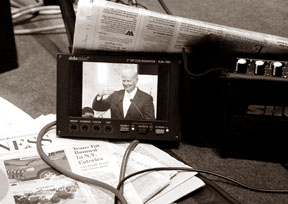|
observer |
|
|
|
|
|
OTHER LINKS |

|

|

|
Israel experts doubt on Israel-Arab conflict
Israeli experts cast doubt on a central thesis of the Baker-Hamilton commission report about U.S. policy in Iraq - that a concerted effort to resolve the Israel-Arab conflict would improve the situation in Iraq. After the report was released last week, Israeli analysts said the "Israel-Palestine first" approach has been tried before by then-U.S. Secretary of State James Baker - and failed. The report of the bipartisan commission examining U.S. involvement in Iraq and recommending future steps includes a declaration that the U.S. "cannot achieve its goals in the Middle East unless it deals directly with the Arab-Israel conflict." The report prescribes direct talks between Israel and its neighbours - Syria, Lebanon and Palestinians, "those who accept Israel's right to exist." Israeli Foreign Ministry spokesman Mark Regev said, "It would not be appropriate for Israel to formally respond to what is ultimately an internal American report," adding that Israel would continue to work closely with the U.S. for peace. There was no immediate comment from Palestinian officials or experts. Gerald Steinberg, from the BESA think tank at Bar Ilan University outside Tel Aviv, gave the Israel-Arab section of the report a "failing" grade, while awarding the rest of the report, about U.S. options in Iraq, a B. While noting that the report might just be a way for domestic critics of the current U.S. policy to "let off steam," Steinberg praised the recommendation to move American troops into a peripheral role in Iraq, "because there is nothing else they can do." He said reducing American casualties might preserve what is left of U.S. influence in the region. When it comes to recommendations about making peace between Israel and the Arab world, Steinberg said, "It repeats the mistakes of the past without learning anything from them." In the 1990s, when Baker was U.S. secretary of state, he pushed hard for Israel to make concessions to the Palestinians, and once grew so frustrated with Israel's refusal that he told Israel's leaders, while testifying before a Congressional committee, to call the White House when they were serious about peace - and gave the White House switchboard phone number. The political constellation now is worse than it was then, according to the Israeli experts. Analyst Akiva Eldar of the dovish Haaretz daily noted that the Islamic militant Hamas is in control of the Palestinian government, and Hamas does not accept the existence of a Jewish state in the Middle East. Syria's regime is more interested in regaining control of Lebanon than it is in making peace with Israel. Efraim Inbar, director of the BESA Center, said the premise that everything revolves around Israel and the Palestinians has been proved wrong. For example, "Iran is not interested in Israel and the Palestinians," he said. "The main issue of regional stability is the nuclearization of Iran, not whether the Palestinians are fighting a low-intensity conflict with Israel." "The way through Jerusalem is blocked," Eldar said , calling the Baker-Hamilton formula for Israel-Arab peace "wishful thinking." Despite the recommendation to talk to Syria and Iran, Eldar said, they "have no interest in helping the U.S. leave Iraq easily without paying a political price." He called the recommendations "predictable," but the parties are not ripe for such progress. "The basic conditions do not exist to allow the U.S. to use an agreement between Israel and the Arabs as a vehicle," he said. There is some concern in Israel that the current Bush administration may be adopting the policy of his father's presidency, concentrating on pressing Israel and blaming it for any lack of progress. Eldar said a conciliatory speech by Israeli Prime Minister Ehud Olmert last week, offering far-reaching territorial concessions in the West Bank, including removal of Jewish settlements, and establishment of a viable Palestinian state in peace negotiations, was aimed as a "pre-emptive strike" at the Baker-Hamilton report. With his offers, Eldar said, Olmert could make a case that Israel is not to blame for any stalemate. AP |








